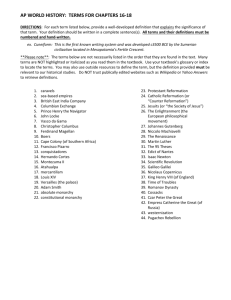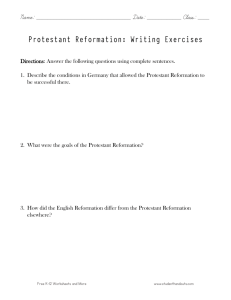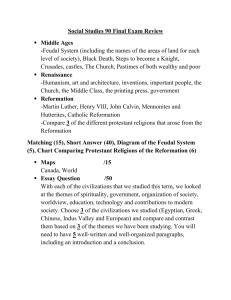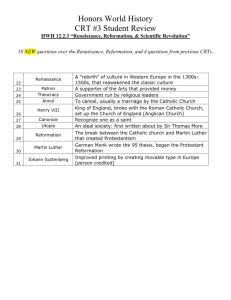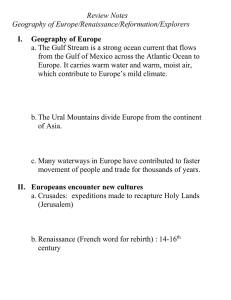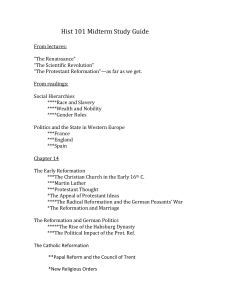GERMANY IN THE AGE OF THE REFORMATION
advertisement
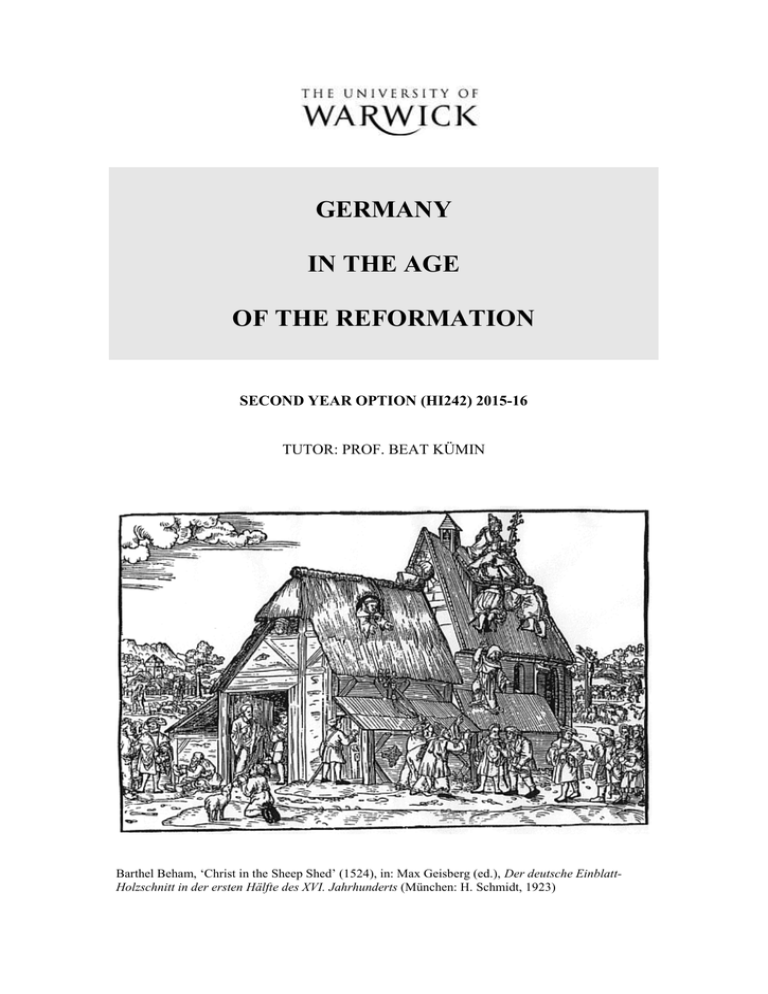
GERMANY IN THE AGE OF THE REFORMATION SECOND YEAR OPTION (HI242) 2015-16 TUTOR: PROF. BEAT KÜMIN Barthel Beham, ‘Christ in the Sheep Shed’ (1524), in: Max Geisberg (ed.), Der deutsche EinblattHolzschnitt in der ersten Hälfte des XVI. Jahrhunderts (München: H. Schmidt, 1923) Module Summary This leaflet contains basic information on ‘Germany in the Age of the Reformation’. Full details on seminars and materials can be found on the module website: http://go.warwick.ac.uk/germanyreformation 1. Context and introduction The Reformation triggered the single most significant set of transformations in early modern Europe. Religion and confessional allegiance shaped the social, economic and political culture of the Continent for centuries to come. The protagonist of the German Reformation, Martin Luther, is universally recognised as one of the outstanding historical figures of all times. ‘Germany in the Age of the Reformation’ allows in-depth engagement with one of the key issues raised by the core module ‘The European World 1500-1750’. It prepares students for more advanced early modern options in the third year. The module builds on a curriculum originally designed by Henry Cohn and assumes no knowledge of German (although, in line with departmental policy, use of foreign languages is strongly encouraged). At the close of the Middle Ages, the Holy Roman Empire experienced an age of unrest. Luther’s new doctrines provided the catalyst for fundamental changes. This module focuses on the socio-cultural impact of the Reformation. Particular attention is given to dissemination processes (role of print; visual propaganda; forging Protestant Churches and identities), the effect on different social groups (Urban / Rural Reformation; Peasants’ War; gender relations) and confessional tensions (Radical Reformation; Catholics; Jews). The course concludes with an assessment of the longterm legacies of the German Reformation. 2. Module tutor and contact details: Prof. Beat Kümin, Office H313. T: (5)24915; e: b.kumin@warwick.ac.uk 3. Times and venues Lectures (weekly, from 1 October): Tuesdays 2-3 pm in …. (venue to be confirmed; not weeks 6, 16) Seminars (weekly, from 1 October): EITHER Tuesdays 10-11 (Group Bucer) in … OR Tuesdays 3-4 in … (Group Luther). See the respective online platforms for details on tasks and activities. 4. Teaching and learning methods: The module will be taught through weekly lectures and 1-hour seminars. Participants are expected to attend classes, read recommended texts in private study and play an active part in seminars. The latter will give opportunities, as appropriate, for brief presentations, discussion in break-out groups or formal debates between opposing sides (facilitated by the Learning Grid). Students write two non-assessed assignments, one of which can be a book review (with the option to add a mock exam). Individual tutorials will give feedback on the latter as well as seminar performance. A workshop on resources and long essay writing will be offered in term 2 and a revision session in term 3. 5. Writing a Book Review: An ideal book review should: summarise the structure, method and main points of the work; discuss how the author’s arguments fit into other writing on the subject; comment on the range of sources used and how they contribute to the argument; explain the strengths and weaknesses of the book from your point of view; assess whether / how the work will advance relevant debates; acknowledge other sources of information in footnotes and a bibliography. It may be helpful to look at other people’s reviews in scholarly journals (many of which are accessible online through the library catalogue), e.g: Archiv für Reformationsgeschichte: Literaturbericht; Central European History; German History; Historische Zeitschrift; History; Journal of Early Modern History; Sixteenth Century Journal; Zeitschrift für historische Forschung. Many websites and search engines also give access to reviews and other relevant materials (see e.g. ‘JStor’ or ‘Reviews in History’). The following is not a definitive list but merely suggestive of books you might like to review. If you have other ideas please discuss them with your seminar tutor: P. Blickle, The Communal Reformation (1992) Th. A.Brady Jr, The Politics of the Reformation in Germany (1997) O. Brunner, Land and Lordship (1995) C. W. Close, The Negotiated Reformation (2009) C. Scott Dixon, The Reformation and Rural Society (1994) H.-J. Goertz, The Anabaptists (1996) H. A. Oberman, Luther: Man between God and Devil (1990) L. Roper, The Holy Household. Women and Morals in Reformation Augsburg (1989) U. Rublack, Reformation Europe (2005) R. Scribner, Popular Culture & Popular Movements in Reformation Germany (1987) G. Strauss, Luther’s House of Learning (1979) 6. Workload and assessment: Written coursework consists of 2 mandatory non-assessed assignments (EITHER two 2,000-word essays OR one 2,000 word essay and one 1,000 word book review) and an optional two-question mock exam. The respective submission dates are Friday of week 8 (autumn term), Tuesday of week 18 (spring term) and Tuesday of week 22 (summer terms). For assessment, students sit a two-hour, two-question paper and write a 4,500 word long essay (to be submitted by the departmental deadline specified on the Undergraduate website). Students should agree an essay title and relevant reading with the module tutor in the course of the Spring Term. There must be no ‘significant’ overlap with exam questions / long essay topics in any module. For regulations on deadlines, word length and extensions see the departmental ‘Assessment’ webpage. The module is based on resources in English, but students with knowledge of German are encouraged to use it in all assessed and non-assessed work. Consult the module tutor for appropriate topics and see the online list of ‘Materials in German’. 7. Aims & objectives: This module highlights the key role of religion in pre-modern society. It provides an in-depth survey of the country which proved seminal for the development of the European Reformation. Students will examine the roots as well as the dramatic sociocultural effects of changes in theology and ecclesiastical organization. The Reformation divided sixteenth-century communities and affected each social / gender group in particular ways. The module draws on extensive primary and secondary materials to illustrate how the people of Germany experienced and in turn shaped these fundamental transformations. 8. Intended learning outcomes: a) the further development of study, writing, presentation and communication skills, including the use of visual evidence and e-resources; b) greater understanding of the importance of religion in early modern society and the socio-cultural impact of confessional change; c) the ability, through writing a 4,500-word essay, of presenting a sustained argument backed by precise and well-chosen evidence drawn from appropriate sources and secondary literature; d) developing critical analytical skills through the assessment of historical approaches often at variance with one another (particularly by participating in debates and writing a book review); e) enhanced awareness of the contributions of different historical sub-disciplines – ecclesiastical history, the historical sociology of religion, gender history, and others – to an understanding of the Reformation. MODEL EXAM PAPER GERMANY IN THE AGE OF THE REFORMATION Time allowed: 2 hours Answer TWO questions Answers should NOT include any significant amount of material already presented in ANY assessed essays. Read carefully the instructions on the answer book and make sure that the particulars required are entered on each answer book. 1. ‘Weak and incapable of reform’. Is this a fair judgement on the Holy Roman Empire around 1500? 2. Why did many people go on pilgrimages in the late Middle Ages? 3. Which aspect of Luther’s theology had the greatest appeal in sixteenth-century Germany? 4. How did the Reformation alter the relationship between the living and the dead? 5. What was the most effective means of communicating the Reformation? 6. ‘In 1525, the German peasants embarked on a “holy war”.’ Do you agree? 7. Did the Reformation make men and women ‘spiritual equals’? 8. What attracted many German princes to the Reformation? 9. Are the religious changes of the 1520s best characterized as a ‘Communal Reformation’? 10. Should the Reformation be seen as a watershed in German history?
